16 Oct 2012 | Uncategorized
Ai Weiwei hasn’t left Beijing for 18 months, and is closely monitored every time he steps outside his house, but even so he manages to keep up a close association with the UK’s cultural scene. He is guest editor of the latest edition of New Statesman magazine to be published this Thursday. And last weekend, he took part — albeit remotely — in the Serpentine Gallery’s Memory Marathon, the final event before the Serpentine Pavilion which Ai designed with Swiss architects Herzog & de Meuron was dismantled yesterday (Monday). His thoughts on the subject of memory were projected on screens alongside the beliefs of leading artists, writers, filmmakers, scientists, architects, musicians and theorists.

A nation’s loss of memory, cutting the connection between generations is a method of totalitarian control that Ai Weiwei described in an interview for Index on Censorship magazine:
You simply burn all the books, kill all of the thinking people and use the poor proletariat to create a very simple benchmark to gauge social change…After just two or three generations deprived of continuity in education we inevitably become completely cut off from our own past.
The latest twist in Ai Weiwei’s tax case is that officials are withdrawing his business licence, Fake Cultural Development (Ai’s business vehicle) had not met registration requirements — unsurprisingly all the necessary documents and the company stamp were confiscated by the police last year. The upside of this ruling is that Ai will not have to pay the rest of the tax bill, but his passport has not been returned and he still cannot travel within China.
Julia Farrington is Head of Arts at Index on Censorship
26 Apr 2012 | Asia and Pacific
The artist Ai Weiwei’s outspoken views are gaining currency. Simon Kirby reflects on a change of mood in China as people lose faith in the Party
In June 2011, Ai Weiwei was released from detention to a form of home surveillance. He is confined to the city of Beijing and must inform the authorities of his movements. He may not make public statements nor comment on his detention and the terms of his release (a condition he has already breached); further investigations are pending and a prosecution may be pursued within a year. It is still far from clear what the implications are for Ai as a private individual, let alone for his capacity to continue to work as an artist. Just as he was never formally arrested neither has he been fully freed.
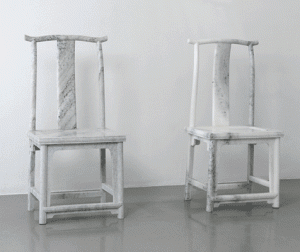 This shabby story takes place against a backdrop of heightened political sensitivity in China as the country braces itself for transition to a new, as yet unannounced, group of top leaders. This is scheduled to take place next year in the Great Hall of the People during the 18th National Congress of the Communist Party. The Congress will certainly be a rigid spectacle of national purpose and will make numbing television viewing. Not least because it will be impossible not to speculate on the nature of the Byzantine succession struggle which is currently taking place behind firmly locked doors.
This shabby story takes place against a backdrop of heightened political sensitivity in China as the country braces itself for transition to a new, as yet unannounced, group of top leaders. This is scheduled to take place next year in the Great Hall of the People during the 18th National Congress of the Communist Party. The Congress will certainly be a rigid spectacle of national purpose and will make numbing television viewing. Not least because it will be impossible not to speculate on the nature of the Byzantine succession struggle which is currently taking place behind firmly locked doors.
The detention of Ai Weiwei was based on intimidation rather than legal process — a pattern that is well established in China. In effect, he was kidnapped by the state and never informed which organ of the machinery was holding him, nor was he charged with a specific crime. Rather, his indictment was based on “confessions”. Even his release was justified on the spurious grounds of cooperative behaviour, willingness to make amends and poor physical health. As the threat of re-opening the case against him still looms, he is now being blackmailed into falling into line.
A few weeks after Ai Weiwei was released I had lunch with him. He talked frankly about the contradictions of his detention and the absurdity of his current position. He clearly intends to continue working and his remarkable personal charisma is undimmed. Yet he is, in my view, a person who is also deeply disturbed by what is happening to him.
Artists and the “Tiananmen contract”
Throughout the 90s, Chinese state-controlled capitalism ushered in a remarkable economic boom from which the fledgling contemporary art scene benefited. Artists, as potentially problematic figures, were heavily co-opted with a variety of sticks and carrots — there were rich rewards to be had and the freedom to continue making, exhibiting and travelling was granted to artists in exchange for creating non-critical work. In many cases, artists were understandably tempted to comply. Ever since the fearful events of the Tiananmen massacre on 4 June 1989, there has been an enforced accommodation between the government and society. I dubbed this the “Tiananmen contract” in an article for Index on Censorship that was published in 2008, ahead of the Chinese Olympics. The deal is that the Communist Party would steer the people towards individual prosperity and the country to greatness, through ensuring stability. In return, the primacy of the Party could never be questioned. Three years ago, the contract was widely supported — the level of basic freedom was greater than it had been in 20 years and living standards were rising. There was also pride at China’s leading role on the world stage. Today, I believe this consensus is much more fragile.
 The daily reality for Chinese citizens is that living costs are rising fast and incomes are not keeping up. Working conditions for white collar workers can be demoralising, while those for migrant manual workers, who continue to have even basic rights denied them, are often shockingly exploitative. Commuting in the new, high-rise cities can be exhausting and alienating. People are deeply sceptical about the capacity of the state to protect them from (often deliberately) contaminated food and a toxic living environment, criminal scams, corruption in the medical profession and corporate exploitation of consumers. The Party is widely understood to be at the centre of many of these scandals and is often seen to be protecting wrongdoers. Most flagrantly, the new super-rich live effectively beyond the reach of the law, while ordinary people can in no way count on basic social justice for themselves and their families.
The daily reality for Chinese citizens is that living costs are rising fast and incomes are not keeping up. Working conditions for white collar workers can be demoralising, while those for migrant manual workers, who continue to have even basic rights denied them, are often shockingly exploitative. Commuting in the new, high-rise cities can be exhausting and alienating. People are deeply sceptical about the capacity of the state to protect them from (often deliberately) contaminated food and a toxic living environment, criminal scams, corruption in the medical profession and corporate exploitation of consumers. The Party is widely understood to be at the centre of many of these scandals and is often seen to be protecting wrongdoers. Most flagrantly, the new super-rich live effectively beyond the reach of the law, while ordinary people can in no way count on basic social justice for themselves and their families.
There are attempts to address these problems through draconian anticorruption campaigns which make examples of officials accused of vice and graft. There are also strenuous efforts to reform social and fiscal legislation and to professionalise the legal system. This year’s 90th anniversary celebrations of the founding of the Chinese Communist Party saw an outpouring of congratulatory media stories featuring joyful ethnic minorities, good comrades and citizens and glorious historical deeds. Meanwhile Tiananmen Square, which is the heart of the great people’s revolution, was firmly sealed and off limits.
In March, I had dinner in a noisy Korean barbecue restaurant in Beijing with a favourite Chinese artist. Only 32 years old, he already enjoys a successful international career, is profoundly patriotic and the holder of an important teaching post. During the evening, my friend passionately expounded an opinion in full earshot of fellow diners and waiting staff that would have made me extremely uncomfortable even five years ago. Namely, that the Chinese Communist Party in 2011 is more fundamentally corrupt than even Chiang Kai-shek’s Kuomintang (KMT or Nationalist Party) of the 40s. The official history, tirelessly propagated in films and TV dramas, is that that the nationalist administration had degenerated into a kind of murderous gangsterism before the 1949 revolution. Yet my artist friend argued that pre-revolutionary society in many ways remained, for all its faults, a pluralistic one: an imperfect democracy. There was at least formal acknowledgment of the independence of the judiciary and channels to seek redress from injustice. The Communist Party of the 21st century, on the other hand, retains its monopoly on power through intimidation and force. It is deeply complicit in land grabs, forced evictions, endemic bribery and corruption. It even facilitates the enrichment of favoured businesses through official contracts and privileged access to resources and markets.
A new trend for speaking out
The legal system today, my friend told me, is explicitly in place in order to serve the interests of the Party above anything else. Citizens who attempt to petition the government to redress flagrant social wrongs can expect to be met at best with official obstruction. In many documented cases they will encounter thuggish intimidation and violence. This viewpoint is not unusual. In a way that is entirely characteristic of China, I then went on to hear the same, previously unimaginable, opinion expressed by three other, unrelated people within the course of as many weeks. If during the course of conversation with people in China, one digs just a little, it’s possible to encounter a profound and worrying cynicism in the integrity of the Chinese state.
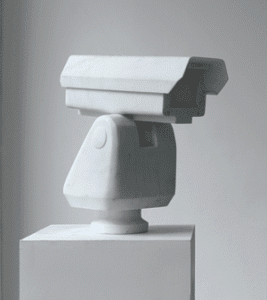 It seems that suddenly these views are being expressed loudly and in public. Ai Weiwei, on the other hand, has been consistently and persistently making his views known. His father, Ai Qing, was one of China’s most eminent poets, but was a political prisoner for 16 years in the western desert region of Xinjiang. This is where Ai Weiwei spent his entire childhood and early adolescence. When Ai Weiwei returned to China in 1993 after ten years in the United States, his rehabilitated father advised him on his responsibility as a Chinese citizen to speak out, reportedly saying, “You are at home here, there’s no need to be polite.”
It seems that suddenly these views are being expressed loudly and in public. Ai Weiwei, on the other hand, has been consistently and persistently making his views known. His father, Ai Qing, was one of China’s most eminent poets, but was a political prisoner for 16 years in the western desert region of Xinjiang. This is where Ai Weiwei spent his entire childhood and early adolescence. When Ai Weiwei returned to China in 1993 after ten years in the United States, his rehabilitated father advised him on his responsibility as a Chinese citizen to speak out, reportedly saying, “You are at home here, there’s no need to be polite.”
An intriguingly enigmatic artist, Ai Weiwei’s public personality is also complex and elusive. The true Ai Weiwei may well be a nuanced combination of the many faults of which his detractors accuse him. However, it has also now become clear, even to his harshest critics, that this artist has courageously maintained a highly principled position for which he is now paying a heavy price. It is my observation that many others are beginning to come round to his point of view.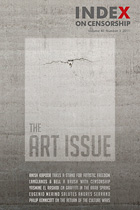
This article appears in the “Art Issue” of Index on Censorship. Click on here for subscription options and more.
Simon Kirby is the director of Chambers Fine Art in Beijing
This issue is nominated for an Amnesty Award
29 Feb 2012 | Awards
Recognising artists, filmmakers and writers whose work asserts artistic freedom and battles against repression and injustice
Voina, performance artists, Russia
 Voina, meaning “War”, is a collective of radical Russian anarchist artists who combine political protest and performance art.
Voina, meaning “War”, is a collective of radical Russian anarchist artists who combine political protest and performance art.
Voina’s carries out actions directed against the authorities. In June 2010, members painted a 65-metre phallus on a drawbridge in St Petersburg which, when raised, faced the city headquarters of the federal security service.
Voina members Vorotnikov and Leonid Nikolayev were imprisoned from November 2010 to February 2011 in connection with an anti-corruption protest and, in July 2011, Russian police issued an international arrest warrant for Vorotnikov. A warrant for the arrest of fellow artist Natalia Sokol was issued in December 2011.
Ai Weiwei, artist, China
 AiWeiwei is a Chinese artist and activist whose work incorporates social and political activism. He has investigated corruption and cover-ups and openly criticised the Chinese government’s record on human rights.
AiWeiwei is a Chinese artist and activist whose work incorporates social and political activism. He has investigated corruption and cover-ups and openly criticised the Chinese government’s record on human rights.
Ai’s 81-day detention in 2011 caused international uproar. He was arrested in April, alongside several of his friends and colleagues. Since the Chinese authorities released him on bail in June 2011, he has been fined $2.4 million in back taxes and penalties. Though officials arrested Ai for alleged economic crimes, supporters say he was punished for his activism and vocal critiques of the government. He paid a $1.3 million bond with loans from supporters, who contributed online and in person and even throwing cash over the walls of his studio in Beijing.
In November 2011, after Ai announced that authorities were investigating his cameraman for pornography in connection with photos that featured the artist and four women naked, internet users responded tweeting nude photos of themselves in support.
Ali Ferzat, cartoonist, Syria
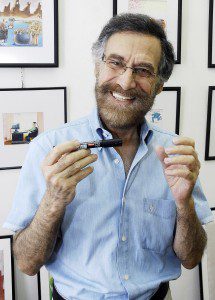 Syrian cartoonist Ali Ferzat has been called “an icon of freedom in the Arab world”. He has spent decades ridiculing dictators in more than 15,000 caricatures. His depictions of President Assad and the police state have helped galvanise revolt in Syria.
Syrian cartoonist Ali Ferzat has been called “an icon of freedom in the Arab world”. He has spent decades ridiculing dictators in more than 15,000 caricatures. His depictions of President Assad and the police state have helped galvanise revolt in Syria.
In August 2011, Ferzat was wrenched from his vehicle in central Damascus by pro-Assad masked gunmen who beat him badly and broke his hands. Passers-by found Ferzat dumped at the side of a road; his briefcase and the drawings inside it had been confiscated by his attackers.
Ferzat earned regional and international recognition in the 1980s with stinging cartoons of officials, autocrats and dictators including Saddam Hussein and Muammar Gaddafi. Saddam Hussein called for Ferzat’s death in 1989 after an unfavourable portrait of him was exhibited in Paris and Ferzat’s cartoons have been banned in numerous Arabic countries.
Min Htin Ko Ko Gyi, poet, Burma
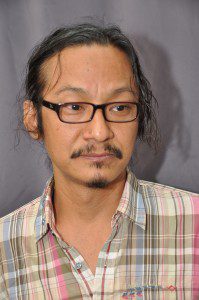 Min Htin Ko Ko Gyi, a poet, filmmaker and screenwriter, co-founded Burma’s inaugural Arts of Freedom Film Festival, which took place in early January 2012.
Min Htin Ko Ko Gyi, a poet, filmmaker and screenwriter, co-founded Burma’s inaugural Arts of Freedom Film Festival, which took place in early January 2012.
Burmese citizens were invited to create a short film on the theme of freedom. Despite the state media’s refusal to cover the announcement, Ko Ko Gyi and his organisers received 188 submissions. Thousands gathered in Rangoon under the banner “Free Art, free thought, freedom”, to watch the selected films. More than 7,000 attendees voted for Cut This Scene to win one of five awards. The film is a satire of a government censorship committee struggling to set the criteria by which to censor films.












